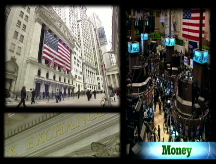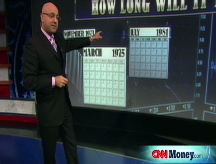Stocks rally after retreat
The markets recover from the previous session's drubbing buoyed on hopes that the country's automakers may yet see some kind of bailout.
NEW YORK (CNNMoney.com) -- Wall Street recharged the rally Tuesday afternoon at the end of a volatile session as investors welcomed signs that the automakers might get a bailout after all.
The Dow Jones industrial average (INDU) gained 3.3%. The Standard & Poor's 500 (SPX) index added 4% and the Nasdaq composite (COMP) climbed 3.7%.
Stocks rallied sharply through the early afternoon, cut gains, and then recharged the advance through the close.
The automakers were in focus throughout the session, releasing monthly sales results and also submitting their bailout plans to Congress. After having been rebuffed last month, the automakers are again seeking access to billions in taxpayer money.
GM, Ford and Chrysler all reported a big plunge in November sales. But investors seemed to take comfort in the growing likelihood that the automakers will get some kind of bailout.
Ford's CEO said that his company can survive through 2009 without government help and that it expects to return to profitability by 2011. However, the company also asked for $9 billion as a "backstop" in case conditions deteriorate. GM said it needs up to $18 billion and Chrysler is seeking $7 billion, bringing the total amount to $34 billion, far more than the $25 billion the industry initially asked for. (For details, click here).
Stocks plunged Monday, with the Dow down 680 points, after reports showed November manufacturing activity hit a 26-year low and that the nation has officially been in a recession since December 2007.
The day's advance was "a bounce off of the previous session's levels," rather than anything more lasting, said Thomas Nyheim, portfolio manager at Christiana Bank & Trust Company.
The selloff Monday followed a massive five-session run that saw the S&P 500 rally 19% after hitting multi-year lows. During the same time, the Dow and Nasdaq both gained nearly 17%.
Although the volatility is likely to continue for the foreseeable future, stocks could manage a rally near the end of this year or start of the next, Nyheim said, as investors anticipate another stimulus package from the new administration.
Also, he said that the automakers will likely get their money too and that this could boost stocks in the short term.
"The positive news is the comparatively low stock valuations," he said. "But the negative is that there really is no catalyst out there for a longer rally. Everyone wants to make their investment plans but they can't because of the recession."
Automakers: The automakers were releasing their November sales results throughout the session. GM (GM, Fortune 500) said sales plunged 41% versus analysts' forecasts for a drop of 33%. Chrysler said sales fell 47%. Ford (F, Fortune 500), Toyota and Honda all reported that sales dropped at least 30%. (Full story)
Both Ford (F, Fortune 500) and GM said that their CEOs will receive a salary of $1 for next year and that the companies will sell their corporate jets. GM may also eliminate its Pontiac and Saturn brands.
The Senate Banking Committee is scheduled to host a hearing Thursday, while the House Financial Services Committee is holding its hearing Friday.
Other company news: Goldman Sachs (GS, Fortune 500) could post a quarterly loss of as much as $2 billion, according to a Wall Street Journal article. The $5-per-share loss would be five times what analysts are currently forecasting. Shares fell 4%.
General Electric (GE, Fortune 500) said fourth-quarter earnings will come in at the low end of its previous forecast, due to the impact of the financial crisis. However, the company also said it will hang on to its dividend and work to maintain its Triple-A credit rating. That rating keeps its borrowing costs lower than most U.S. companies. Shares gained 13.6%. (Full story).
3M (MMM, Fortune 500) shares fell 2.4% after Citigroup downgraded the Dow component to "sell" from "hold" and also cut its 2009 earnings forecast. Citi said that a stronger dollar and weaker economy will hurt the heavy-machinery maker going forward.
Market breadth was positive. On the New York Stock Exchange, winners topped losers by over three to one on volume of 1.62 billion shares. On the Nasdaq, advancers beat decliners by over five to two on volume of 2.2 billion shares.
Bonds: Treasury prices gained, lowering the yield on the benchmark 10-year note to 2.67% from 2.75% Monday. Treasury prices and yields move in opposite directions.
The yield on the 3-month Treasury bill improved to 0.05% from 0.025% Monday, but still not far from 68-year lows of zero hit last month. The 3-month is seen as the safest place to put money in the short term. A low yield means wary investors would rather preserve cash despite earning little or no interest on it than risk the stock market.
Lending rates eased. The 3-month Libor rate slipped to 2.21% from 2.22% Monday, while overnight Libor fell to 1% from 1.09% Monday, according to Bloomberg.com. Libor is a key bank lending rate.
Other markets: The dollar gained versus the yen but fell against the euro.
U.S. light crude oil for January delivery eased $2.32 to settle at $46.96 a barrel on the New York Mercantile Exchange, a 3-1/2 year low.
COMEX gold for February delivery rose $6.50 to settle at $783.30 an ounce.
Gasoline continued the fall to nearly four-year lows, with prices down eight-tenths of a cent to a national average of $1.812 a gallon, according to a survey of credit-card swipes released Tuesday by motorist group AAA. Prices have been sliding for 2 1/2 months, and have dropped more than $2 a gallon or 53%.
Asian markets slumped and European markets rallied. ![]()




